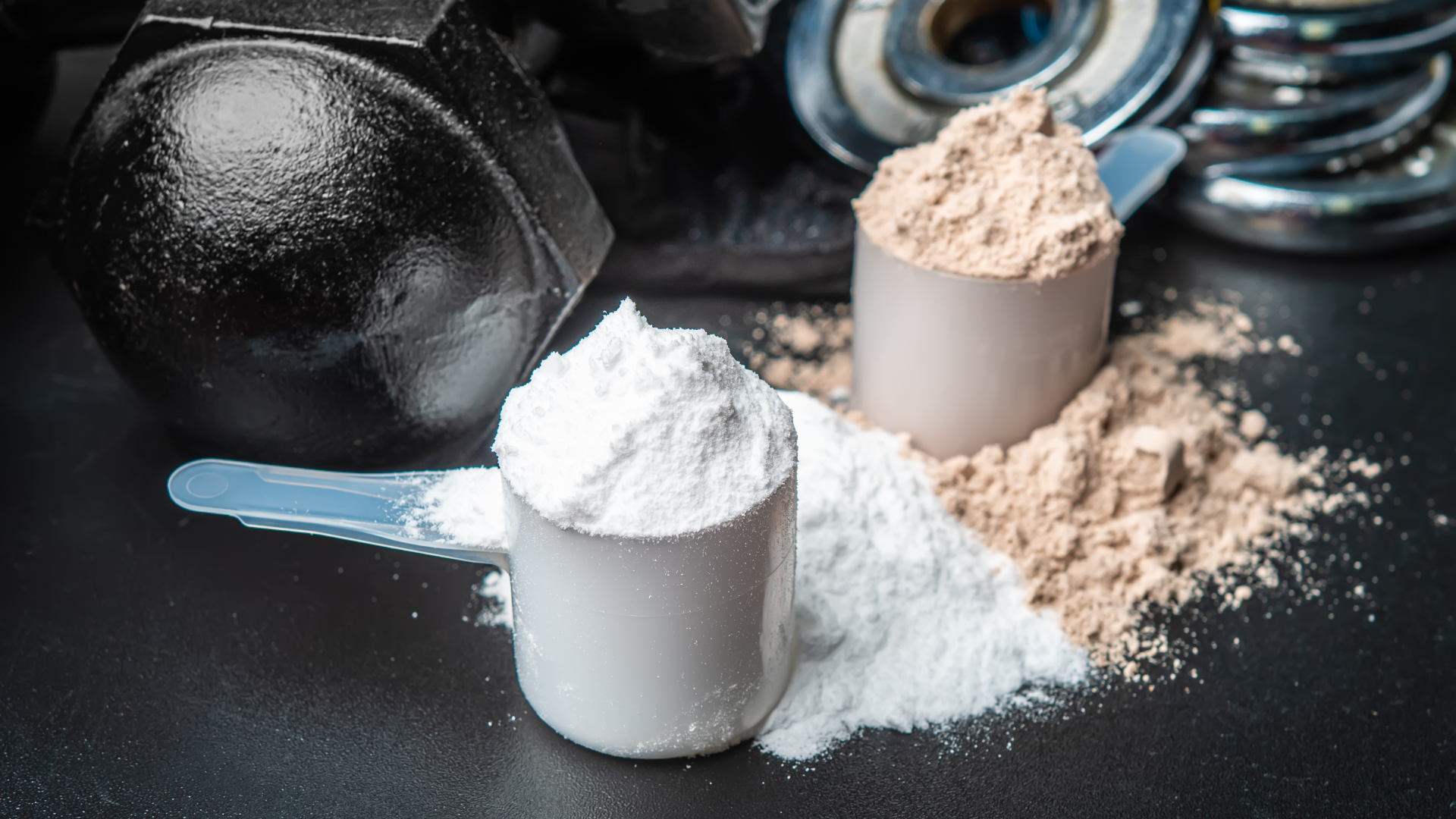Grab your cheatsheet |
You are leaving the gym and the guy swaggering along the corridor ahead of you is shaking up a milky-looking drink… but what has he got in there?
And is it the secret to how he got so stacked??
Well, it could be a number of things. There are a whole host of workout supplements, with different athletes swearing by different products and brands.
Two of the most popular are whey protein and creatine. People use them to achieve the same goal, but they work in different ways. And we offer both at Crazy Nutrition, so it’s something we know about.
So, which is best?
Whey protein powder or creatine supplement?
We’re exploring the differences between creatine and protein powder to help you figure out which one you should take.
What is Whey Protein?
Whey is a protein derived from milk, which can be drunk as a protein shake, and is used in baking or added to foods such as smoothies and oats. Getting enough protein in your diet is a key component of your fitness regime.
We are discussing whey protein supplements in this article because it is the highest quality form of protein on the market. It is also a complete protein containing all nine essential amino acids and a high proportion of branched-chain amino acids. This is why it is so powerful when it comes to enhancing muscle protein synthesis.
Adults require up to 2g grams of protein per kilo of body weight per day to ensure their muscles grow and repair as efficiently as possible after exercise. If you weigh 80kg, you’ll need to eat 12 eggs or 5 chicken breasts a day to hit this target without the help of a protein shake - not easy!
Protein powder is an easy and convenient way to increase your protein intake without significantly increasing your calorie intake.
What is Creatine?
Our muscles require creatine to create energy, particularly for fast muscle contractions. Our cells naturally produce some creatine, and we can absorb small amounts from eating meat and fish, but that combination alone won’t provide enough creatine to get the full benefit from the substance.
Creatine isn’t a protein; it is an organic compound. However, it is a similar substance to amino acids (the building blocks of protein) and our body can synthesize creatine from the amino acids glycine and arginine.
The most common form of creatine supplement is creatine monohydrate which provides a wide range of health benefits; from helping ease the symptoms of conditions such as epilepsy to improving our short-term memory in this article, we are focusing specifically on how it aids muscle growth and sports performance.
Like protein powder, creatine can be mixed with water or juice. Many people start by ‘loading’ creatine to ensure they have a high level within the body. To achieve this, you can take 20 grams every day for a week and then continue with 3-5 grams per day after that.
Creatine vs. Whey Protein: what is the difference?
So, now we know what they are, let’s look at what they do, and which might be best depending on what you are looking for.
Muscle Growth
Creatine supplements and whey protein powders have been proven time and time again to facilitate improved muscle growth in adults who exercise when tested against adults who exercise without the help of workout supplements. They just use different mechanisms to do it.
Creatine increases our capacity to exercise by providing extra explosive power and decreasing muscle fatigue during a workout, whereas whey protein encourages muscle protein synthesis, to ensure you are gaining the maximum amount of muscle density from each training session.
Muscle Recovery
Studies on using creatine supplementation as a recovery aid are mixed, and while some say it speeds up post-workout recovery, we can’t be sure about this until more conclusive research is conducted.
Whey protein on the other hand, absolutely helps us to recover faster between workouts.
Weight Loss
Both products help increase muscle mass, and the more muscle we have, the more calories we burn. However, whey protein powder also helps you feel full and reduces cravings.
- Related content: Do protein shakes help with weight loss?
Sports Performance
If your goal is to improve performance, particularly anything which requires quick bursts of explosive energy from the lower body (e.g. sprinting or jumping), creatine can be a powerful addition to your routine
Some compound exercises, such as squats, also have an explosive element - the eccentric (up) phase - and creatine has been proven to improve squat progress. It also has less of an impact on our upper body strength or endurance fitness.
Whey protein is helpful for performance, in that we need it as an energy source to perform at our best, so if you aren’t getting enough protein from food alone, you will need to take a protein supplement. While those who are focused on sports performance might think that creatine is the most important supplement, keeping track of your daily protein intake should always be your first step.
Do you have to choose?
The good news is you can safely take both creatine and whey protein together. They are a brilliant supplement combination which supercharges workouts and gives muscles the nutrients they need to grow and perform.
When should you take whey protein and creatine?
It doesn’t really matter when you take creatine, anytime throughout the day will produce the same benefits. If you take both, you can mix your creatine with your protein shake.
Protein is a little more complex. Your main concern should be getting enough protein throughout the day, but the timing can have some impact. Many fitness experts recommend taking whey protein within 30-45 minutes of your workout, with others preferring to take it before a workout.
Should I use Creatine Supplements or Whey Protein Powder?
Both whey protein powder and creatine are highly effective at helping build muscle. They can safely be taken together and are an effective combination to ensure every workout counts.
Using both products delivers similar outcomes, but as the two substances use different mechanisms to achieve those results, means they are complementary.
If you are able to get enough protein (up to 2g grams of protein per kilo of body weight per day) from food alone, there may be limited benefits to adding a whey protein supplement. However, very few people manage to do this consistently day after day. Protein is really the foundation of your exercise nutritional needs, so this should be your first focus. Take a look at our whey TRI-PROTEIN powder.
It is even more difficult (practically impossible) to get enough creatine from our diet to produce the maximum effects, so once you are hitting your daily protein target, consider adding in creatine to give you that extra edge. Check out our Ultimate CRN-5 creatine formula.



